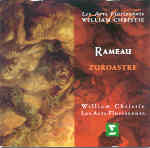What a strange work–strange even for Rameau, who within the strictures of the French Baroque tends to surprise more often than any of his contemporaries. Premiered in 1749 and met with a less than warm reception, Zoroastre was thoroughly revised by the composer and re-presented in 1756. The second version is the one recorded here. The plot concerns the good philosopher (Zoroastre) and the evil sorcerer Abramane and their battle for the hand of Amélite, the heiress to the Bactrian throne. The Princess Erenice also loves Zoroastre, but his lack of interest in her sends her to Abramane’s side. In the original, the love interests were a minor thread–the librettist and Rameau may have been more interested in either Zoroastrianism or Freemasonry, the battles between good and evil, or conflicts between light and dark. Those philosophical issues remain in the libretto, but Erenice’s nastiness and berserk jealousy, Abramane’s snideness and attempts to keep Erenice in check, and the love between Amélite and Zoroastre are what keep us interested, textually speaking.
The tragedies, such as Hippolyte et Aricie and Castor et Pollux keep us more engaged in character–but here, further juice comes from battles, religious ceremonies of stunning depth and piety, scenes of supernatural transformation, disappearance and transportation, storms, and the many dance interludes. Abramane’s Act 3 interruption of the good guys’ wedding ceremony–from the sky, in a chariot of flame–is just one example of the sort of razzle-dazzle this opera contains.
As ever, Rameau’s scoring is ravishing, and William Christie and his Les Arts Florissants never let us lose sight of its unique flavor. Four oboes, two flutes, and two clarinets add spice; the horns and bassoons take us deep into Abramane’s temple vault; and we’re carried throughout by the full complement of strings (16 violins, 8 violas, 7 cellos, a pair of double-basses, and continuo). The playing and Erato’s recording are just about ideal: the instruments and voices are perfectly balanced and crystal clear, and the depth and special effects called for give us a theatrical perspective.
Mark Padmore, billed here as an “haute-contre”, copes amazingly well with Zoroastre’s high tessitura; he still has the power for some strong exclamation and his moments of tenderness are beautiful. (Christie’s pitch is A=392, a full tone below today’s standard concert pitch; is there a tenor alive who would sound natural at the current height? Sigiswald Kuijken’s old recording on Deutsche Harmonia Mundi is pitched a half-tone higher.) Nathan Berg’s Abramane is suitably evil, and if he sings a bit wildly, it’s all in character. The same might be said about the cruel-sounding Erenice of Anna-Maria Panzarella, who has no fear of painfully leaning on a vibratoless note in order to prove a point. Gaëlle Méchaly’s Amélite is fearless in coloratura and sweet-sounding when needed but retains the position of heiress-to-the-throne.
Some of the smaller roles are peculiarly sung (“Vengeance” in Act 4, for example), but this may have been purposefully done for emphasis. Christie has taken eight dances out of their contexts and placed them as an appendix on the third CD. This is a fine idea, since, as stunning as the dances are, they can slow down the action, particularly on a recording. As mentioned above, this fascinating work may not be as emotionally engrossing as some of the tragedies, but it is a wonderful creation, and this performance is splendid.
































